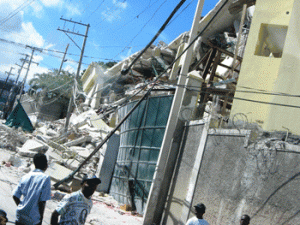Recovering from the quake
By Shiva Kashi

Photos by Stephanie Pereira. The devastation in Haiti has continued long after the initial quakes. Dangerous aftershocks mean that residents aren’t allowed to rebuild their homes for fear that they will tumble down again.
It was in the late afternoon on Jan. 12, when Nikdosht Nouban noticed the floor of her second-storey apartment in Port-au-Prince begin to shake. She ducked in a doorway for refuge.
“[It seemed like] the shaking was never going to stop. I was really scared and felt totally powerless,” said Nouban, a purchasing manager of an evaporated milk company in Port-au-Prince, who is now dedicating most of her time helping the casualties in her region.
She recalled: “People rushed to [the] streets immediately. I could see them crying, yelling out the names of their loved ones, praying aloud or just in extreme shock. Our country was already poor. This earthquake was really not what we needed.” Nouban watched as the city she was born in fell to ruins.
“International aid arrived really fast and has been great,” Nouban said. “I never imagined such cooperation from so many different countries from all around the globe. It shows that our world has managed to stay independent from its materialistic evolution and still has kept its great human and fraternity values.”
Stephanie Pereira, a Haitian-born sports therapist in Port-au-Prince who is now working full time with Haitian and foreign-aid workers, said she has also been impressed by the relief efforts. “We have received many supplies of medication and life essentials from different countries, arriving one after another from the airport,” Pereira said.
Still, there are some hurdles in the quest to provide aid to survivors. “The major problem is what we can refer to as an egotism issue,” Pereira said. “Especially on the US side whose authorities and government always wanted, and still wants, to take over the monopoly of everything.
“They have taken over the international airport and have pretty much kicked everyone else out. They even sent away the French aid, who had to land in the Dominican Republic and enter Haiti again from there by land.
“In the hospital that I work in, the American and French doctors don’t even talk to each other, which has caused a lot of tension and problems. Of course, it is always the patients who have to pay for their vanity. I can go on and on about what I face every day but it is time for all of us to focus on what we have in common rather than our differences in difficult times.”
She also explained that Haiti still needs help, especially donations of non-perishable food, medicine and tents, since the shelters are full and there are still hundreds of people who have to live on the streets with little to no food, spending day and night outside.
“Some people have started building back their walls, at least to gain some security, but the government has forbid them to do so,” Pereira said. “There have been over 50 aftershocks already and there is a possibility that more people might end up under the rubbles.
“We are all broken after this terrible disaster, but Haitian people are very strong. I do believe that we will find a way to make it happen. It will take a lot of time.”
Both Nouban and Pereira recommend that everyone who is still willing to send help choose trusted organizations, as fraud is not unheard of in such situations. They suggest donating to either Doctors Without Borders or the Red Cross.



